Navigating the Cloud Landscape: Choosing the Right Provider
Choosing the right cloud provider is crucial for success. This listicle simplifies comparing cloud providers, offering a clear breakdown of the top 8 platforms. We’ll cover AWS, Azure, GCP, IBM Cloud, Oracle Cloud Infrastructure, Alibaba Cloud, Tencent Cloud, and DigitalOcean. This guide helps you navigate complex pricing structures, service offerings, and feature sets so you can make informed decisions and optimize your cloud investment. Whether you’re a startup or an enterprise, this comparison empowers you to select the best fit for your specific needs.
1. Amazon Web Services (AWS)
When comparing cloud providers, Amazon Web Services (AWS) consistently emerges as a dominant force. As the market leader with roughly 32% market share, AWS offers a comprehensive cloud platform boasting over 200 fully-featured services from data centers globally. This makes it a compelling choice for a wide array of users, from startups in India looking for scalable solutions to multinational enterprises needing robust and reliable infrastructure. Its extensive offerings cover computing power, diverse storage options, sophisticated networking capabilities, and cutting-edge tools for machine learning, analytics, and much more. Millions of customers, including startups, established enterprises, and government agencies, rely on AWS’s mature infrastructure, designed for high reliability and security.
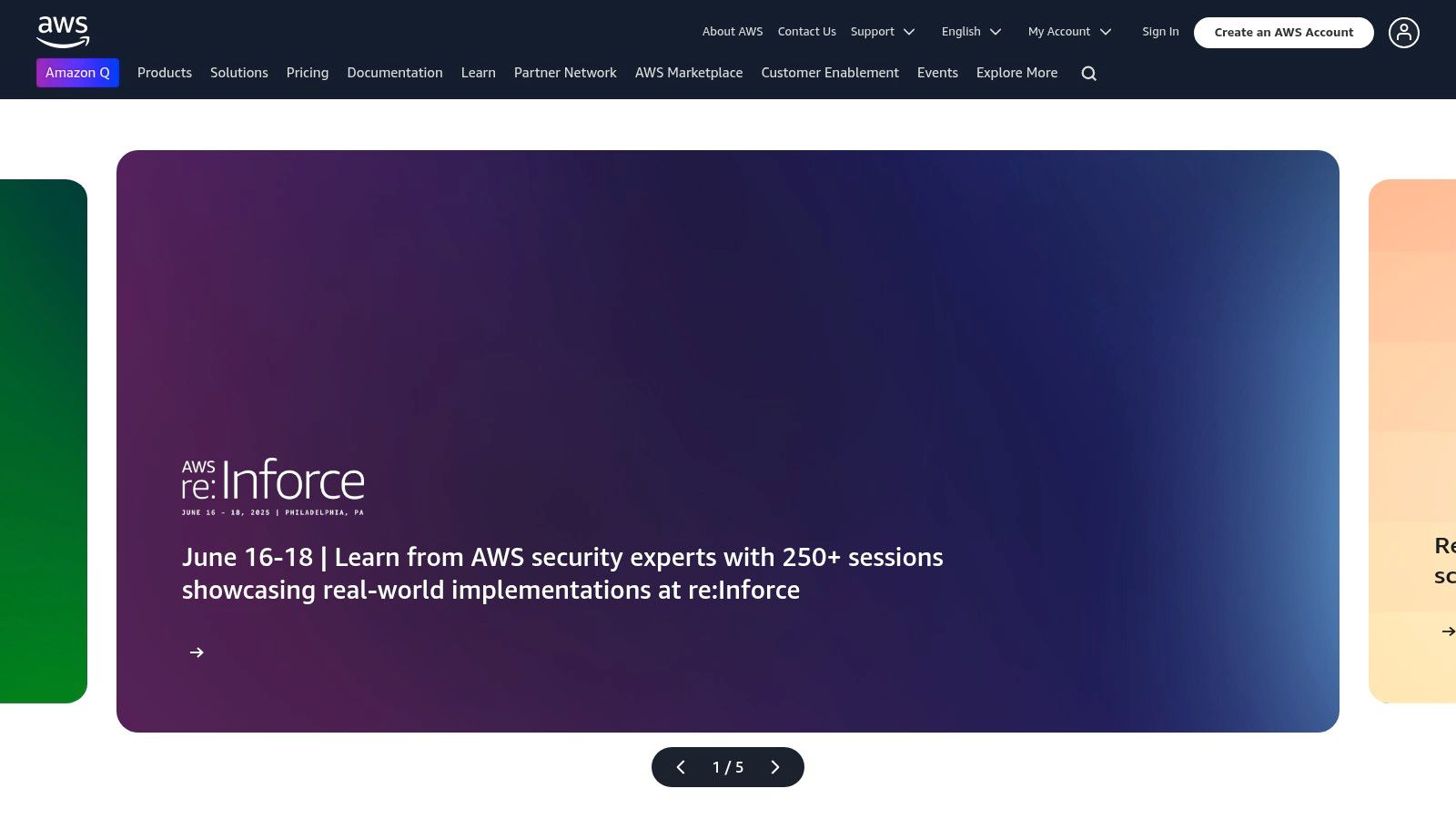
AWS’s breadth and depth of services are unmatched. Key services include Elastic Compute Cloud (EC2) for scalable virtual servers, Simple Storage Service (S3) for object storage, Lambda for serverless computing, and Relational Database Service (RDS) for managed databases. This extensive catalog allows businesses to build and deploy virtually any type of application or workload. For businesses in the IN region, AWS’s global infrastructure, spanning 26 geographic regions with 84 availability zones, ensures low latency and high availability. This widespread presence is particularly beneficial for businesses aiming to serve a geographically dispersed customer base or comply with data residency requirements within India.
Features:
- Broadest and deepest set of services (200+): Including EC2, S3, Lambda, RDS, and many more.
- Global infrastructure: Spanning 26 geographic regions with 84 availability zones.
- Advanced security features: Compliance certifications for virtually every regulatory agency.
- Extensive partner ecosystem: Thousands of marketplace offerings.
- Comprehensive serverless computing capabilities: Simplifying development and deployment.
Pros:
- Market-leading maturity and feature completeness: Offering a solution for almost any cloud need.
- Extensive documentation and large community support: Making troubleshooting and learning easier.
- Highly reliable with strong SLAs: Ensuring business continuity.
- Most comprehensive global infrastructure footprint: Reducing latency and improving performance for users in IN and globally.
Cons:
- Pricing structure can be complex and difficult to navigate: Requiring careful planning and monitoring.
- Learning curve can be steep for newcomers: Demanding time and effort for upskilling.
- Cost management requires active monitoring: Preventing unexpected expenses.
- Support plans can be expensive for smaller organizations: Potentially straining budgets.
Implementation/Setup Tips:
- Start with a free tier: Explore AWS services and get hands-on experience without incurring costs.
- Use the AWS Cost Calculator: Estimate your cloud spending based on your specific needs.
- Leverage AWS documentation and training resources: Gain a better understanding of the platform and its services.
- Consider using AWS managed services: Reduce operational overhead and complexity.
Pricing: AWS utilizes a pay-as-you-go pricing model, with costs varying depending on the specific services used and the resources consumed. This granular pricing allows for flexibility, but careful monitoring is crucial for cost optimization.
Why AWS Deserves Its Place: AWS earns its top spot in comparing cloud providers due to its unparalleled breadth of services, mature infrastructure, global reach, and robust security. While the pricing structure can be complex, the sheer range of options and the reliability of the platform make it a compelling choice for organizations of all sizes, particularly those operating within or targeting the IN region.
Website: https://aws.amazon.com/
2. Microsoft Azure
Microsoft Azure is a robust cloud computing platform delivering a comprehensive suite of services for building, testing, deploying, and managing applications and services through Microsoft-managed data centers. Holding approximately 21% of the market share, Azure stands out when comparing cloud providers, especially for its strength in hybrid cloud scenarios and seamless integration with the Microsoft ecosystem. This makes it a compelling choice for organizations, particularly those in the IN region, heavily reliant on Microsoft technologies, offering them strong enterprise capabilities and a wealth of compliance features. Azure provides everything from virtual machines and databases to AI and machine learning services, catering to diverse business needs.

Azure’s deep integration with existing Microsoft products makes it particularly attractive for enterprises already utilizing tools like Windows Server, Active Directory, and SQL Server. This interoperability simplifies migration and management, allowing businesses to leverage their current infrastructure and expertise while transitioning to the cloud. For startups and early-stage companies in IN looking to scale rapidly, Azure offers a pay-as-you-go model and a variety of services to support growth. Cloud architects and developers benefit from Azure’s comprehensive set of tools for building and deploying applications, including robust DevOps capabilities.
Key Features and Benefits:
- Seamless Microsoft Ecosystem Integration: Existing Microsoft customers can easily integrate Azure with their current infrastructure and tools like Windows Server, Active Directory, and SQL Server, streamlining operations and minimizing disruption.
- Robust Hybrid Cloud Capabilities: Azure Arc and Azure Stack enable a consistent hybrid cloud environment, allowing businesses to manage on-premises, edge, and multi-cloud resources seamlessly. This is particularly relevant for businesses in IN with distributed operations.
- Advanced AI and Machine Learning: Azure Cognitive Services provides pre-trained models and customizable APIs for incorporating AI and machine learning into applications, empowering businesses to leverage the power of data.
- Secure Identity and Access Management: Azure Active Directory offers industry-leading identity and access management solutions, ensuring secure access to cloud resources and enhancing overall security posture.
- Comprehensive Compliance and Governance: Azure boasts an extensive range of compliance certifications and governance tools, helping organizations meet regulatory requirements and maintain data security.
Pros:
- Ideal for enterprises already invested in Microsoft products.
- Powerful hybrid cloud and edge computing solutions.
- Robust governance and compliance tools.
- Cost-effective licensing benefits for existing Microsoft customers.
Cons:
- Documentation can be challenging to navigate compared to competitors like AWS.
- The management interface is subject to frequent updates, requiring continuous learning.
- Certain services may lag behind AWS in terms of maturity and feature richness.
- Performance can vary across different regions.
Pricing: Azure follows a pay-as-you-go model with pricing varying depending on the specific services used. Detailed pricing information is available on the Azure website.
Technical Requirements: Specific technical requirements depend on the chosen services. However, a stable internet connection and appropriate client software are generally required.
Implementation Tips:
- Start with a clear understanding of your business requirements and choose the appropriate Azure services.
- Leverage existing Microsoft expertise within your organization to streamline implementation.
- Explore Azure’s extensive documentation and training resources.
- Consider using Azure’s cost management tools to optimize spending.
Comparison with AWS: When comparing cloud providers, Azure and AWS are frequently considered. While AWS boasts a larger market share and arguably more mature services in some areas, Azure excels in its integration with the Microsoft ecosystem and its hybrid cloud capabilities. The best choice depends on specific organizational needs and existing infrastructure.
Website: https://azure.microsoft.com/
Azure offers a powerful and versatile platform for businesses of all sizes, from startups to large enterprises. When comparing cloud providers, Azure’s robust features, deep Microsoft integration, and strong hybrid cloud capabilities make it a valuable option, particularly for organizations in IN already leveraging Microsoft technologies.
3. Google Cloud Platform (GCP)
When comparing cloud providers, Google Cloud Platform (GCP) stands out as a powerful contender, especially for organizations prioritizing data analytics, machine learning, and cutting-edge technologies. GCP offers a suite of cloud computing services running on the same infrastructure that powers Google’s own products, like Search, Gmail, and YouTube. This gives it an inherent advantage in handling massive datasets and complex computations. With approximately 9% market share, GCP caters to a growing number of businesses, particularly those focused on data-driven innovation.
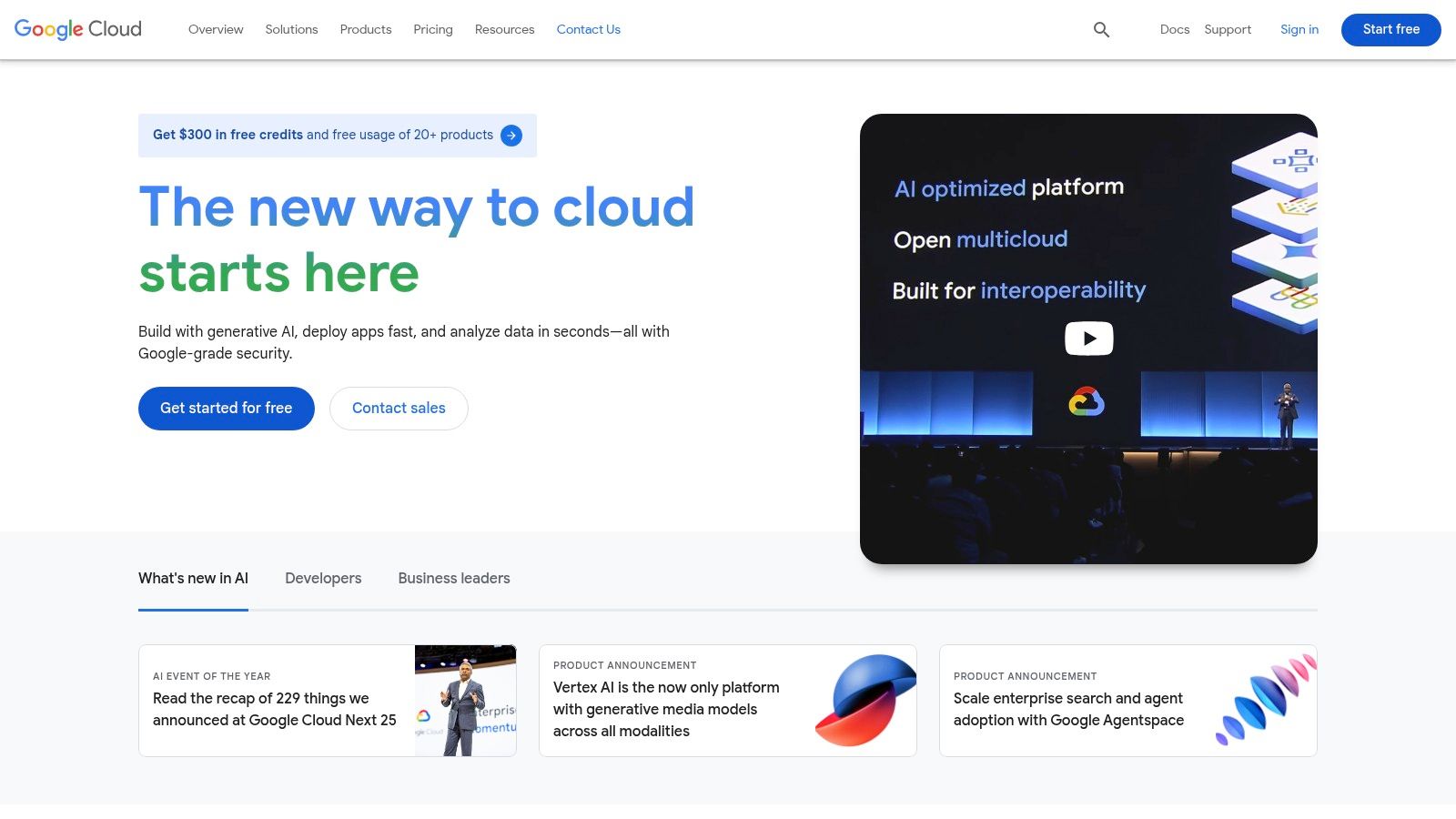
GCP’s strength lies in its robust data analytics and machine learning capabilities. Tools like BigQuery, a serverless, highly scalable, and cost-effective multi-cloud data warehouse designed for business agility, empower businesses to analyze massive datasets quickly and efficiently. Dataflow enables stream and batch data processing for advanced analytics and real-time insights. Furthermore, Vertex AI provides a unified platform for building and deploying machine learning models, while TensorFlow, an open-source machine learning framework developed by Google, allows for sophisticated model development. For businesses in India experiencing rapid growth and data accumulation, these tools are invaluable for deriving actionable insights and driving business decisions.
For containerized workloads, Google Kubernetes Engine (GKE) offers a managed environment based on Kubernetes, the industry-leading container orchestration technology. This allows for seamless deployment, management, and scaling of containerized applications. Another notable feature is live migration of virtual machines, minimizing downtime and ensuring business continuity, a critical factor for businesses in the IN region. Google’s global networking infrastructure, renowned for its low latency and high throughput, ensures fast and reliable access to applications and services, regardless of location.
Features:
- Industry-leading data analytics with BigQuery and Dataflow
- Advanced machine learning and AI tools through Vertex AI and TensorFlow
- Kubernetes-native infrastructure with Google Kubernetes Engine (GKE)
- Live migration of virtual machines with zero downtime
- Global networking infrastructure with low latency and high throughput
Pros:
- Superior data analytics and machine learning capabilities
- Innovative pricing models including sustained use discounts, which can significantly reduce costs for long-running workloads.
- Leading container orchestration technology
- Highly reliable networking infrastructure built on Google’s global backbone
Cons:
- Smaller global footprint compared to AWS and Azure, potentially impacting latency in some regions, though Google is actively expanding its presence in India.
- Fewer total services compared to market leaders, which might require integrating with third-party solutions in certain cases.
- Enterprise support and adoption still growing, although Google is rapidly investing in this area.
- Limited hybrid cloud options until recent Anthos expansion.
Implementation/Setup Tips:
- Start with a free trial to explore GCP’s services and estimate costs.
- Leverage Google’s extensive documentation and training resources.
- Consider using Google’s professional services for complex deployments.
Pricing: GCP offers a pay-as-you-go pricing model with various discounts and cost optimization options. Specific pricing details can be found on the GCP pricing page. Technical requirements vary depending on the services used, and detailed information is available in the GCP documentation.
Why GCP deserves its place in the list: GCP’s focus on data analytics, machine learning, and containerization makes it a compelling choice for modern businesses. For startups and enterprises in India looking to leverage the power of data and AI, GCP offers cutting-edge tools and infrastructure to drive innovation and growth. Comparing cloud providers thoroughly is crucial, and GCP’s unique strengths make it a serious contender in the cloud landscape.
Website: https://cloud.google.com/
4. IBM Cloud
When comparing cloud providers, IBM Cloud stands out as a robust platform tailored for enterprise-grade applications, especially in regulated industries. IBM Cloud combines the flexibility of platform as a service (PaaS) with the control of infrastructure as a service (IaaS), offering a comprehensive solution for businesses seeking scalability, security, and compliance. Its roughly 5% market share reflects its focus on specific niches where its strengths shine. For businesses in India navigating complex regulatory landscapes, IBM Cloud’s focus on compliance can be particularly appealing.
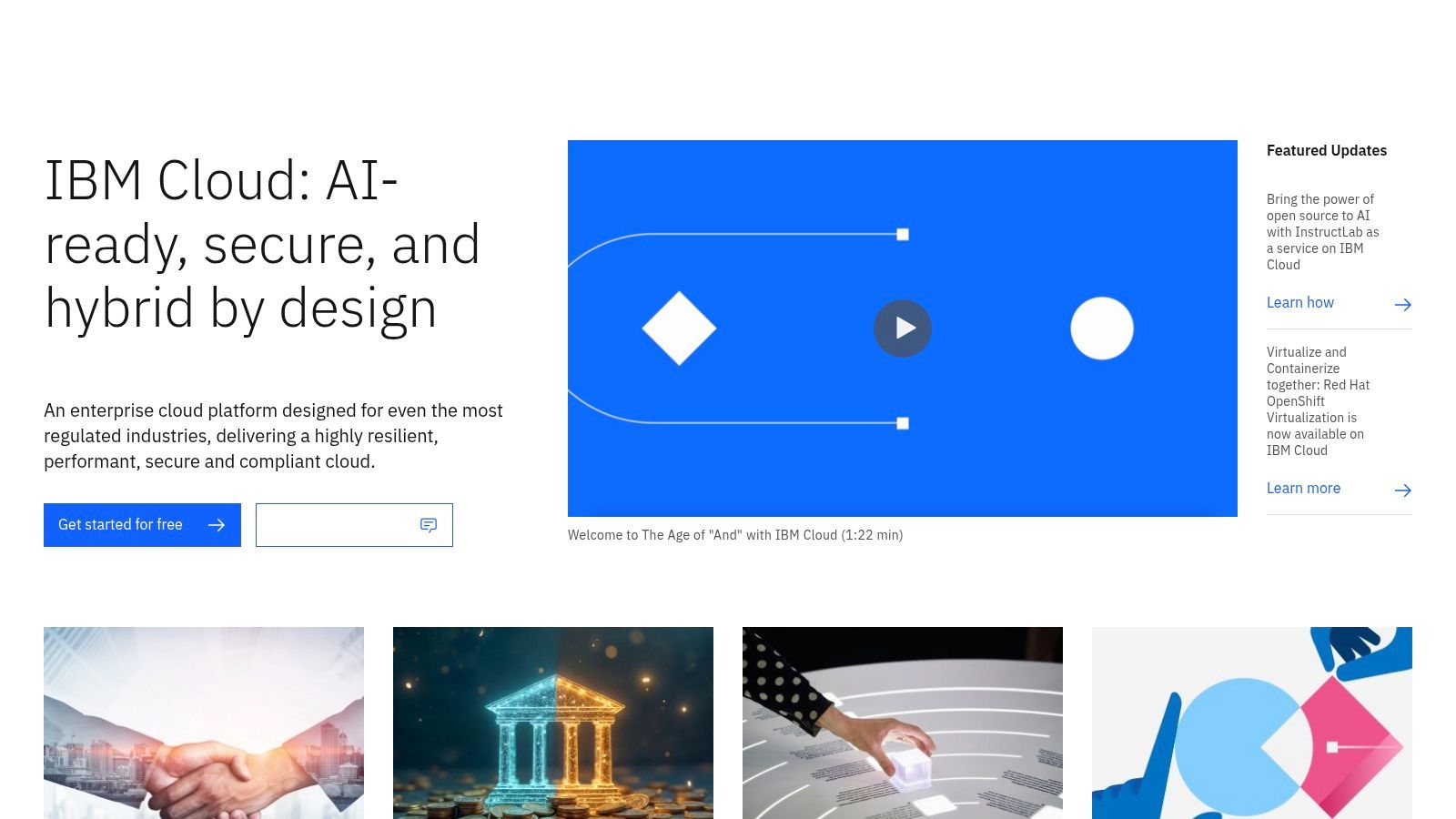
IBM Cloud differentiates itself through its strong emphasis on open-source technologies, particularly through its Red Hat OpenShift integration, facilitating seamless hybrid cloud deployments. This allows businesses to leverage existing on-premise infrastructure while gradually migrating to the cloud. Furthermore, its industry-specific solutions cater to the unique needs of sectors like finance, healthcare, and government, offering tailored services that address compliance and security requirements.
Key Features and Benefits:
- Hybrid Cloud Prowess: Industry-leading hybrid cloud capabilities, powered by Red Hat OpenShift, enable businesses to seamlessly integrate on-premise infrastructure with the cloud, offering flexibility and scalability.
- Compliance Focus: Robust compliance certifications and security features make IBM Cloud an ideal choice for heavily regulated industries like finance, healthcare, and government, especially relevant in the Indian market.
- AI and Watson: Leverage the power of IBM’s Watson AI services to build intelligent applications and gain valuable insights from your data.
- Bare Metal Performance: For demanding workloads, IBM Cloud offers bare metal server options with high performance guarantees.
- Cloud Satellite: Extend IBM Cloud services to any environment—edge, on-premises, or other cloud providers—providing consistency and control across your entire infrastructure.
Pros:
- Ideal for Regulated Industries: Excellent for businesses operating in heavily regulated industries, offering robust compliance and security features.
- Hybrid and Multi-Cloud Management: Powerful tools for managing hybrid and multi-cloud environments, enabling greater flexibility and control.
- Enterprise-Grade Security: Robust security and governance features provide peace of mind for businesses handling sensitive data.
- Industry Expertise: Deep industry-specific expertise and solutions cater to the unique needs of various sectors.
Cons:
- Complex User Interface: The user interface can be complex and less intuitive compared to competitors like AWS or Azure.
- Limited Global Reach: Fewer availability zones and data centers compared to major competitors might limit geographic flexibility.
- Smaller Service Portfolio: While offering a comprehensive suite of services, the overall portfolio is less extensive than AWS or Azure.
- Developer Experience: The developer experience is often cited as less streamlined than competitors.
Pricing and Technical Requirements:
IBM Cloud offers a pay-as-you-go pricing model, allowing businesses to only pay for the resources they consume. Specific pricing details vary based on the services utilized. Technical requirements depend on the chosen services and deployment model. Visiting the IBM Cloud website (https://www.ibm.com/cloud) is recommended for detailed pricing information and technical documentation.
Implementation Tips:
- Start Small: Begin with a pilot project to test and familiarize yourself with the platform.
- Leverage IBM’s Resources: Utilize IBM’s extensive documentation and support resources.
- Consider Professional Services: For complex deployments, consider engaging IBM’s professional services team.
IBM Cloud deserves its place in this list because it offers a powerful and secure platform tailored for enterprise needs. While the user interface and global reach might present challenges, its focus on hybrid cloud, security, and industry-specific solutions makes it a strong contender, particularly when comparing cloud providers for businesses in regulated industries and those looking to modernize their existing infrastructure in India.
5. Oracle Cloud Infrastructure (OCI)
When comparing cloud providers, Oracle Cloud Infrastructure (OCI) emerges as a powerful contender, specifically designed for enterprise workloads and demanding applications. With a focus on performance, security, and cost-effectiveness, OCI offers a comprehensive suite of infrastructure and platform cloud services. Its approximately 2% market share is steadily growing, particularly amongst businesses deeply invested in Oracle’s ecosystem. This makes it a compelling choice for organizations prioritizing high performance and those seeking robust solutions for their Oracle-based applications.
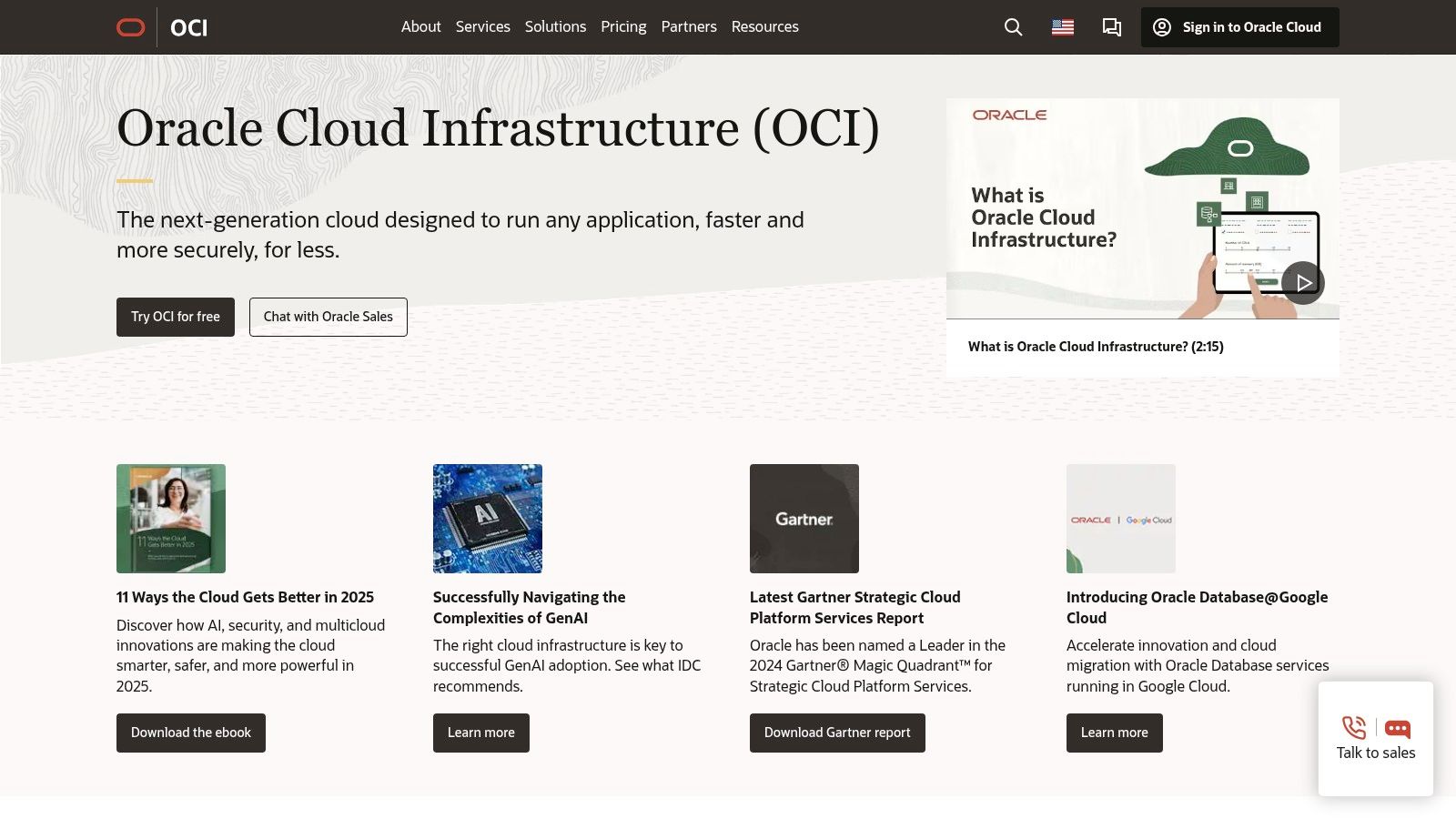
OCI’s strength lies in its optimized performance for Oracle workloads and databases. This is especially relevant for businesses in India where Oracle databases are widely used across various sectors. Its Autonomous Database, featuring self-driving and self-securing capabilities, simplifies database management and reduces operational overhead, a significant advantage for startups and enterprise IT departments alike. The offering of bare metal compute instances coupled with high-performance networking ensures optimal resource utilization and low latency for demanding applications. OCI also boasts consistent pricing with predictable costs and, importantly for data-intensive operations, no egress charges for most services. For government agencies and highly regulated sectors in IN, OCI’s dedicated cloud regions provide enhanced security and compliance.
Key Features & Benefits:
- Optimized for Oracle Workloads: OCI is designed to seamlessly integrate with and optimize the performance of existing Oracle databases and applications, making migration and modernization smoother.
- Autonomous Database: This self-managing database leverages machine learning to automate routine tasks, enhance security, and optimize performance, freeing up valuable time for developers and DBAs.
- Bare Metal Compute: Offers high-performance, low-latency computing power ideal for demanding workloads and applications requiring dedicated resources.
- Predictable Pricing: OCI’s transparent and consistent pricing model, including no egress charges for most services, helps organizations effectively manage their cloud spending.
- Dedicated Regions for Government & Regulated Sectors: Addresses the specific security and compliance requirements of these sectors.
Pros:
- Best-in-class performance for Oracle database workloads.
- Simplified pricing model with potentially lower costs compared to other providers, particularly for Oracle-centric environments.
- Strong SLAs with financial guarantees provide assurance and reliability.
- Autonomous capabilities significantly reduce operational overhead.
Cons:
- OCI’s global footprint is smaller compared to hyperscale providers like AWS or Azure, which might limit regional availability for some specialized services.
- The third-party integration ecosystem is still developing, although expanding rapidly.
- Developer tools and services, while improving, are not as comprehensive as those offered by more established providers.
- Being a relatively newer platform, OCI is still building its market presence and wider community support.
Implementation Tips:
- Start with a clear understanding of your workload requirements and assess the suitability of OCI based on your existing Oracle investments.
- Leverage OCI’s free tier to explore the platform and test its capabilities before committing to a paid plan.
- Utilize the extensive documentation and resources provided by Oracle to streamline the migration and deployment process.
- Consider engaging with Oracle’s support team or certified partners for expert guidance and assistance.
Comparing with Similar Tools: When comparing OCI to AWS, Azure, or GCP, it distinguishes itself through its superior performance specifically for Oracle workloads and its competitive pricing model, particularly beneficial for organizations heavily reliant on Oracle technologies. While the other providers offer broader ecosystems and a wider range of services, OCI’s focus on Oracle makes it a compelling choice for businesses already invested in that ecosystem.
Website: https://www.oracle.com/cloud/
OCI earns its place in this list by offering a specialized and powerful solution for organizations prioritizing performance, security, and cost-effectiveness for their Oracle workloads. While it may not be a one-size-fits-all solution, its targeted approach makes it an excellent option for specific use cases, particularly within the Indian market where Oracle technologies are prevalent.
6. Alibaba Cloud (Aliyun)
Alibaba Cloud (Aliyun) is a strong contender when comparing cloud providers, especially for businesses with a focus on the Asia-Pacific region, and particularly China. As the cloud computing arm of the Alibaba Group, it boasts a comprehensive suite of over 100 cloud products and services, rivaling the offerings of Western giants like AWS, Azure, and Google Cloud. While it holds approximately 6% of the global market share, its dominance in the Chinese market makes it a crucial consideration for any business looking to expand its presence there. Alibaba Cloud provides a full range of services, from elastic computing and storage solutions to sophisticated database and big data offerings. This breadth of services makes it suitable for a variety of use cases, from hosting simple websites to complex enterprise applications.
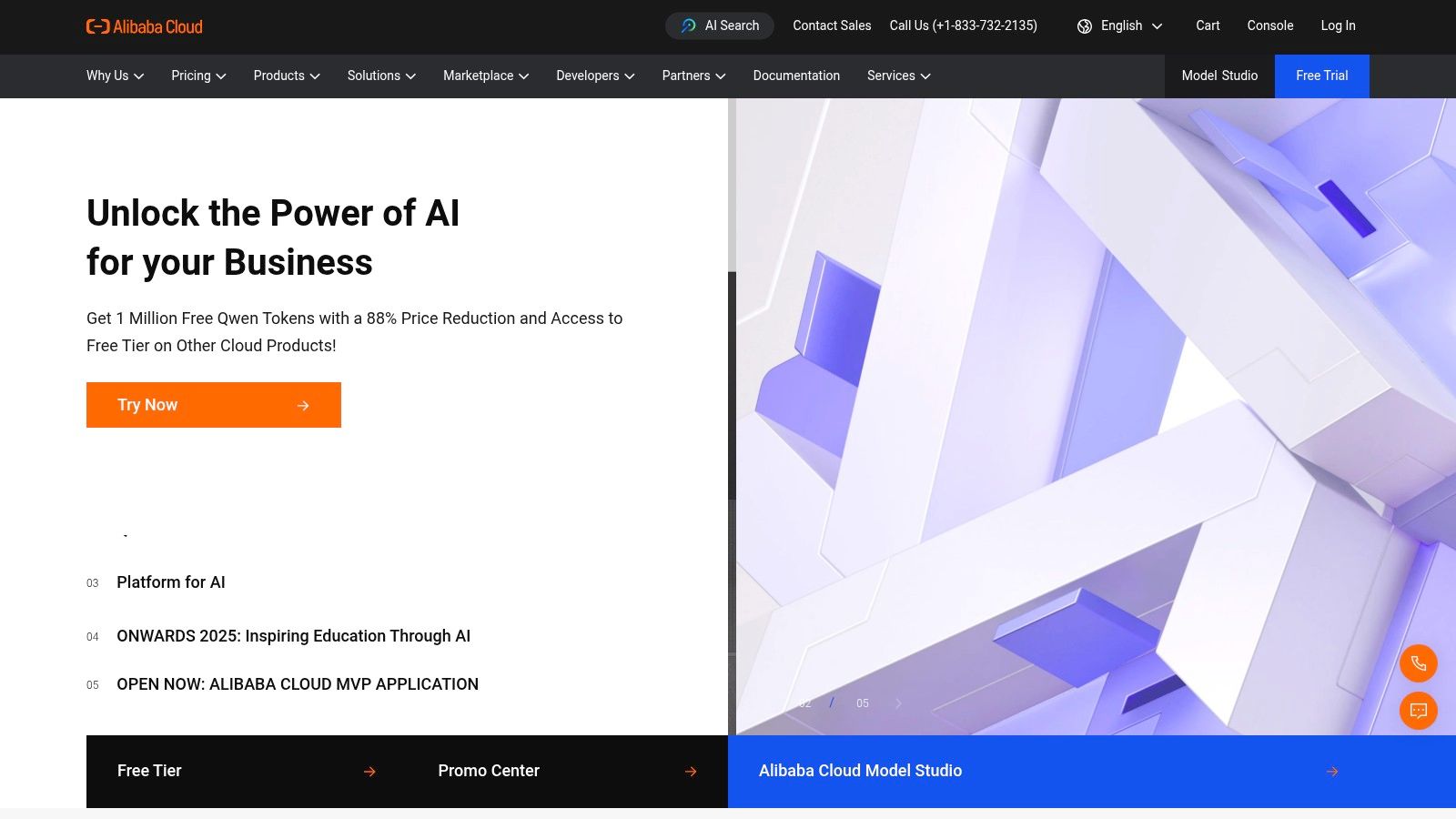
For businesses operating within India, Alibaba Cloud offers strategically located data centers across Asia, including India, providing low latency and improved performance for applications serving the IN region. Its global network also extends to North America, Europe, the Middle East, and Australia, allowing for international scalability. When comparing cloud providers for Indian businesses, Alibaba Cloud’s robust presence in Asia makes it a compelling alternative to Western-centric providers. Its advanced networking capabilities, including global acceleration, further enhance its appeal for businesses with international operations.
Features and Benefits:
- Dominant access to mainland China: Unparalleled access to the burgeoning Chinese market makes Alibaba Cloud the go-to solution for companies targeting this region.
- Comprehensive suite of services: Over 100 cloud products and services cover a vast range of computing needs, from basic hosting to complex AI solutions.
- Specialized e-commerce and digital transformation services: Leveraging Alibaba’s extensive experience in e-commerce, Alibaba Cloud offers tailored solutions for online businesses, including specialized tools for retail and digital marketing.
- Integration with Alibaba’s ecosystem: Seamless integration with Alibaba’s existing services, such as payment gateways (Alipay) and logistics networks (Cainiao), streamlines business operations for companies already within the Alibaba ecosystem.
Pros:
- Best option for the Chinese market: Unmatched access and localized services make it the ideal choice for China-focused businesses.
- Competitive pricing: Often more cost-effective compared to Western providers, particularly for services deployed in the Asia-Pacific region.
- Strong performance in Asia-Pacific: Data center proximity ensures low latency and high performance for businesses operating in the IN region.
- Specialized solutions for retail and e-commerce: Tailored solutions cater specifically to the needs of online businesses.
Cons:
- Limited presence in North America and European markets: While expanding globally, its presence outside Asia is still developing.
- Documentation and support: English documentation and support can sometimes be less comprehensive than that provided by Western counterparts.
- Compliance with Chinese regulations: Businesses may need to navigate Chinese regulatory requirements, which can be complex.
- Developer experience: While improving, the developer experience may not be as refined as with some Western providers.
Implementation/Setup Tips:
- Start with a free trial: Explore Alibaba Cloud’s services risk-free with the free trial to get a feel for the platform.
- Utilize the comprehensive documentation: While sometimes lacking in English, Alibaba Cloud provides extensive documentation. Leverage online communities and forums for additional support.
- Consider a hybrid approach: For businesses with global operations, a hybrid cloud strategy leveraging Alibaba Cloud for Asia-Pacific operations and another provider for other regions might be optimal.
Website: https://www.alibabacloud.com/
Alibaba Cloud deserves its place in this list comparing cloud providers because it offers a unique value proposition, particularly for businesses focused on Asia and China. While certain aspects like documentation and Western market presence are still developing, its competitive pricing, strong performance in the Asia-Pacific region, and specialized e-commerce solutions make it a powerful alternative to consider, especially for those operating within the IN region. For startups, enterprise IT departments, cloud architects, DevOps teams, and business decision-makers, understanding Alibaba Cloud’s strengths can unlock significant opportunities in one of the world’s fastest-growing digital markets.
7. Tencent Cloud
Tencent Cloud, a subsidiary of the Chinese tech behemoth Tencent, offers a compelling suite of cloud services tailored for specific niches. While its global market share hovers around 3%, don’t let that fool you. Tencent Cloud leverages its parent company’s vast experience in gaming, social networking, and multimedia, providing specialized services beyond standard infrastructure offerings. This makes it a strong contender when comparing cloud providers, especially for businesses operating in or targeting the Chinese market.
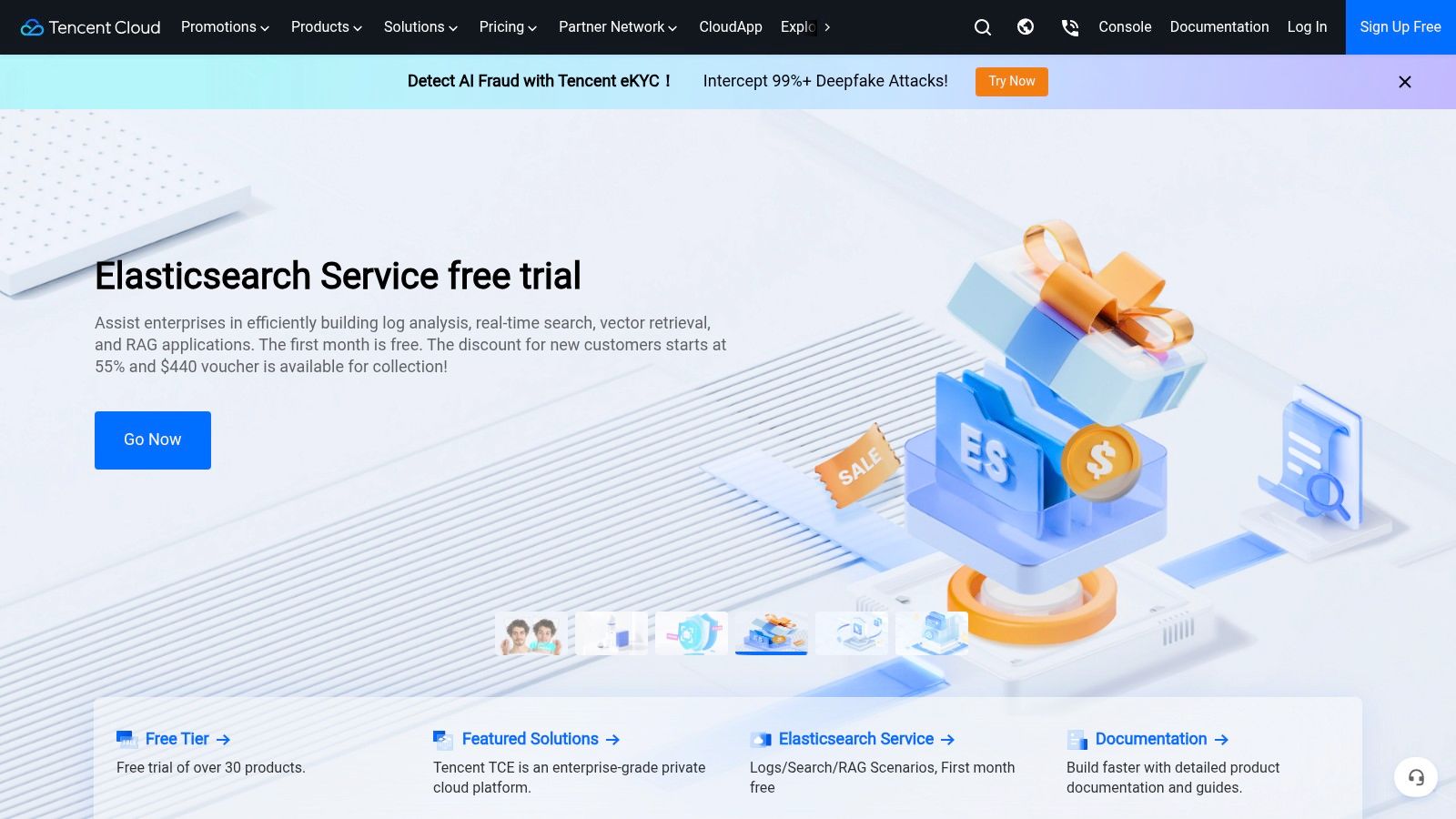
Tencent Cloud shines in areas like video streaming, game development and hosting, and real-time communication, making it a powerful choice for companies in these sectors. Its robust Content Delivery Network (CDN) is optimized for delivering content within China, a significant advantage for businesses targeting this market. Furthermore, its deep integration with the WeChat ecosystem provides unparalleled access to this massive user base. For developers, Tencent Cloud offers comprehensive SDKs and APIs in various programming languages, facilitating seamless integration with their applications. While specific pricing details vary depending on the services used, Tencent Cloud is generally considered competitively priced, particularly when compared to Western providers.
For startups and early-stage companies in India looking to expand into the Chinese market, Tencent Cloud offers an attractive entry point. Its specialized services for gaming and media can be particularly beneficial for companies in these industries. Enterprise IT departments can leverage Tencent Cloud’s infrastructure and expertise to optimize their operations in China. Cloud architects and developers can benefit from the platform’s advanced features and APIs, while DevOps and infrastructure teams can leverage its scalability and reliability. Business decision-makers and CTOs should consider Tencent Cloud as a viable option for their cloud strategy, especially when targeting the Chinese market.
Features:
- Industry-leading content delivery network optimized for China
- Specialized gaming cloud services supporting major global gaming companies
- Advanced media processing, streaming, and communication services
- Integration with Tencent’s WeChat ecosystem for the Chinese market
- AI and machine learning capabilities focusing on natural language processing
Pros:
- Superior performance for content delivery into China
- Best-in-class gaming and real-time communication services
- Competitive pricing compared to Western providers
- Strong media processing capabilities
Cons:
- Limited global footprint compared to larger providers like AWS or Azure. While expanding, it’s important to check data center availability in your target regions.
- English documentation and support can be inconsistent, which might pose a challenge for non-Chinese speaking teams.
- Fewer enterprise-focused services compared to competitors like AWS or Azure.
- Regulatory concerns similar to other Chinese cloud providers. Businesses should be aware of data privacy and compliance regulations when using Tencent Cloud.
Implementation Tips:
- Start with a thorough assessment of your needs and compare Tencent Cloud’s services with other providers.
- Leverage the free tier and trial periods to test the platform and its features.
- Consult with Tencent Cloud’s support team or partners to address any specific requirements.
- Pay close attention to data privacy and compliance regulations when deploying applications on Tencent Cloud.
Website: https://intl.cloud.tencent.com/
Tencent Cloud earns its place in this list of cloud providers comparing cloud providers due to its unique strengths in the Chinese market and its specialized services for gaming, media, and real-time communication. While it might not be the ideal choice for every business, its competitive pricing and specific niche expertise make it a valuable option to consider, especially for companies with operations in or targeting China. For businesses in India looking for robust services for reaching the Chinese market, Tencent Cloud is certainly a provider worth exploring.
8. DigitalOcean
DigitalOcean carves a niche for itself in the crowded cloud provider landscape by focusing on simplicity and developer experience. This makes it a compelling option when comparing cloud providers, especially for startups, SMBs, and individual developers. While it doesn’t offer the extensive array of services found in hyperscale providers like AWS or Azure, its straightforward pricing, user-friendly interface, and excellent documentation make it an ideal starting point for those new to cloud computing or those looking for a less complex solution. This focus allows smaller teams to quickly deploy and manage applications without getting bogged down by the intricacies of larger platforms.
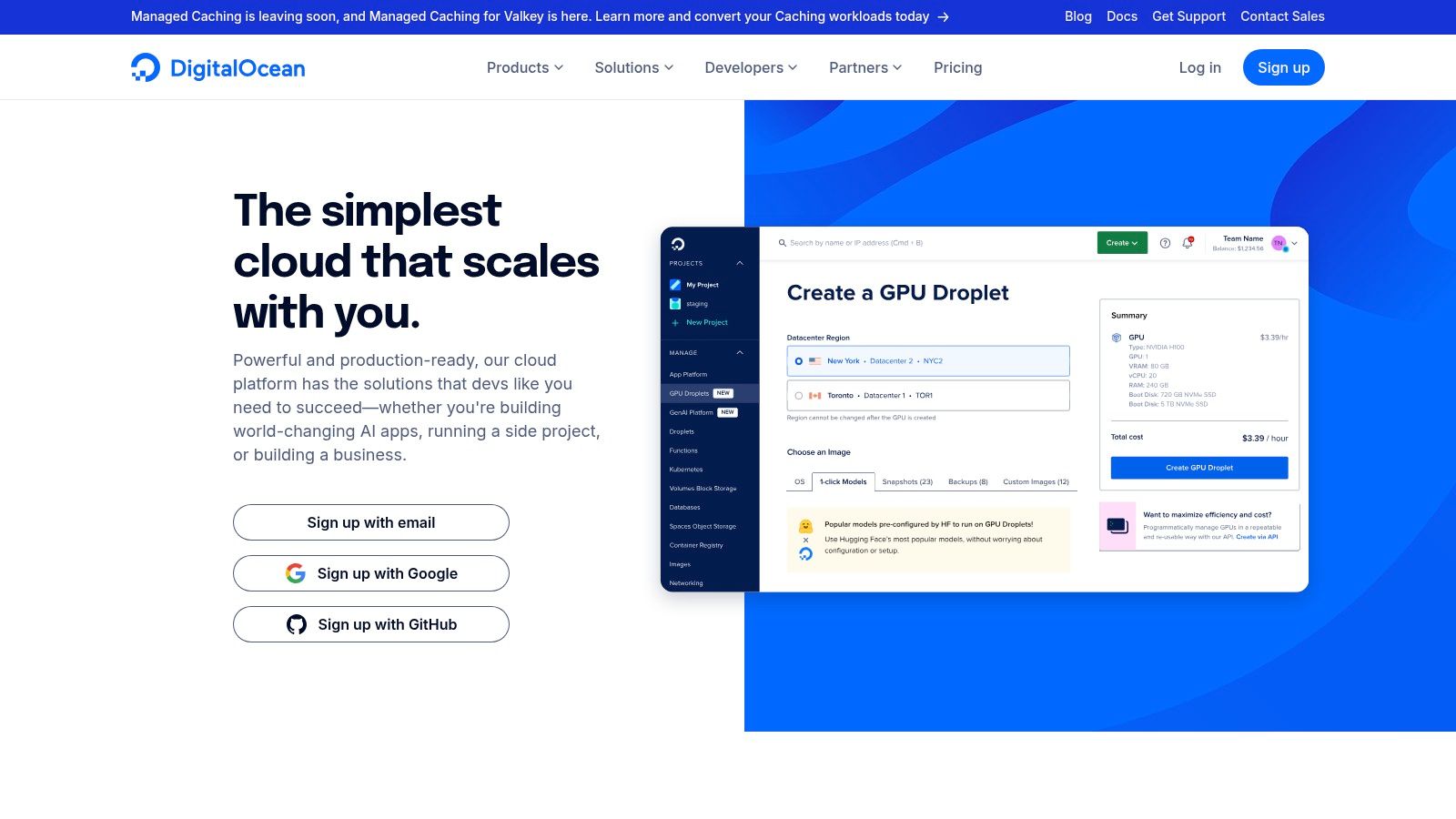
DigitalOcean’s strength lies in its core infrastructure offerings: compute, storage, networking, and databases. Its managed Kubernetes service simplifies container orchestration, while the App Platform provides a PaaS experience for deploying applications without managing the underlying infrastructure. They also offer managed databases like PostgreSQL and MongoDB, catering to common development needs. For example, a startup in India can leverage DigitalOcean’s Kubernetes service to deploy a scalable web application backend, taking advantage of the simplified management and predictable pricing. Similarly, developers can quickly spin up a test environment for a new project using Droplets (virtual machines) without navigating complex configuration options.
Pricing: DigitalOcean follows a transparent, predictable pricing structure. Droplets (virtual machines) start from as low as $4/month, offering various configurations based on CPU, RAM, and storage. Managed Kubernetes clusters start from $12/month, and managed databases have pricing tiers based on size and performance. This predictable pricing is beneficial for budgeting, particularly for startups and smaller businesses in the IN region looking to control their cloud spending.
Technical Requirements: DigitalOcean primarily requires familiarity with Linux-based systems and basic networking concepts. For managed services like Kubernetes and App Platform, understanding containerization and application deployment principles is helpful. Their comprehensive documentation and tutorials, however, bridge the knowledge gap and enable even novice users to get started quickly.
Comparison: While DigitalOcean simplifies cloud computing, it doesn’t offer the breadth of services found in AWS, Azure, or Google Cloud. If your project requires specialized services like AI/ML, advanced analytics, or a wide range of compliance certifications, these larger providers might be a better fit. However, for projects focused on core infrastructure with a need for simplicity and ease of use, DigitalOcean provides a strong alternative, especially for those comparing cloud providers in the context of cost-effectiveness and ease of management.
Implementation Tips:
- Start with the tutorials: DigitalOcean’s extensive documentation is a valuable resource for getting started. Explore the tutorials on deploying applications, managing Droplets, and using the managed Kubernetes service.
- Utilize the community: DigitalOcean boasts a vibrant community forum where users can find answers to common questions and share best practices.
- Leverage the control panel: The user-friendly control panel simplifies server management, allowing you to easily provision resources, monitor performance, and manage your account.
Pros:
- Exceptionally simple user experience and management interface
- Transparent, predictable pricing structure
- Excellent documentation and tutorials for developers
- Strong performance for the price point
Cons:
- Limited service offerings compared to major cloud providers
- Fewer global regions and availability zones (although they are expanding)
- Fewer enterprise-grade security and compliance features
- Limited advanced services like AI/ML or specialized analytics
Website: https://www.digitalocean.com/
DigitalOcean deserves its place in this list for its commitment to simplicity and developer experience. It offers a viable and often preferable alternative to the complexity of hyperscale providers when comparing cloud providers, particularly for smaller teams and individuals seeking an easy-to-use and cost-effective platform for their projects.
Cloud Providers Comparison Overview
| Cloud Provider | Core Features & Capabilities | User Experience & Quality | Value Proposition | Target Audience | Unique Selling Points |
|---|---|---|---|---|---|
| Amazon Web Services (AWS) | 200+ services, global 26 regions & 84 AZs, advanced security | Mature platform, strong SLAs, large community | Flexible but complex pricing | Enterprises, startups, gov’t | Broadest service range, global footprint, serverless |
| Microsoft Azure | MS ecosystem integration, hybrid cloud, AI & governance tools | Enterprise-friendly, evolving UI | Licensing benefits for MS users | MS product users, enterprises | Hybrid cloud strength, Azure AD identity |
| Google Cloud Platform | BigQuery, Vertex AI, GKE, live VM migration, low latency networking | Developer-centric but smaller ecosystem | Competitive pricing with discounts | Data-driven orgs, AI/ML users | Superior analytics & ML, Kubernetes-native |
| IBM Cloud | Red Hat OpenShift hybrid, compliance focus, Watson AI, bare metal | Complex UI, less intuitive | Good for regulated industries | Regulated industries, enterprise | Hybrid via OpenShift, regulatory expertise |
| Oracle Cloud Infra (OCI) | Optimized for Oracle DB, autonomous DB, bare metal, predictable pricing | Strong SLAs, newer platform | Simplified & cost-effective | Oracle-centric enterprises | Autonomous DB, no egress fees, gov’t dedicated regions |
| Alibaba Cloud (Aliyun) | Major China market, 100+ services, e-commerce tools, global acceleration | Strong APAC focus, documentation limited | Competitive vs Western providers | China/Asia market, e-commerce | China market dominance, Alibaba ecosystem integration |
| Tencent Cloud | CDN for China, gaming & media focus, AI NLP, WeChat integration | Good China presence, limited global reach | Competitive pricing | Gaming, media, China-focused firms | Best for China content delivery & gaming solutions |
| DigitalOcean | Simple cloud, developer-friendly, managed K8s & DBs, app platform | Very easy UI, clear docs | Transparent, predictable pricing | Developers, startups, SMBs | Simplified pricing & UX, focused core services |
Making Your Cloud Decision: Key Takeaways
Comparing cloud providers is a critical step for any organization leveraging cloud computing, whether you’re a startup, enterprise, or individual developer in the IN region. This article explored a diverse range of providers, from industry giants like AWS, Azure, and GCP to specialized solutions like DigitalOcean, IBM Cloud, Oracle Cloud Infrastructure, Alibaba Cloud, and Tencent Cloud. Each platform brings its own strengths and weaknesses to the table. While AWS boasts an extensive service catalog, others like DigitalOcean provide more targeted solutions for specific user groups.
Key takeaways when comparing cloud providers include prioritizing your unique business needs, technical requirements, and budget. Consider which platforms offer the best performance, scalability, and security features for your specific use cases. For those just starting their cloud journey, even simple tasks like setting up a WordPress site can be a great way to explore different cloud providers and their offerings. Source: Hello world! from pluscloud Don’t overlook factors like compliance requirements, data sovereignty within IN, and the quality of customer support when making your decision.
Implementing the right cloud tools involves careful planning and execution. Understanding service level agreements (SLAs), managing costs effectively, and integrating your chosen platform with existing systems are crucial for success. Choosing the best cloud platform is not a one-size-fits-all decision. By carefully evaluating your needs and leveraging the insights from this article, you can empower your organization to thrive in the cloud.
Navigating the complexities of comparing cloud providers can be challenging. Streamline your cloud journey and maximize your return on investment with Signiance Technologies. We provide expert guidance and personalized cloud strategies tailored to your specific business needs, helping you select and implement the ideal cloud platform.
